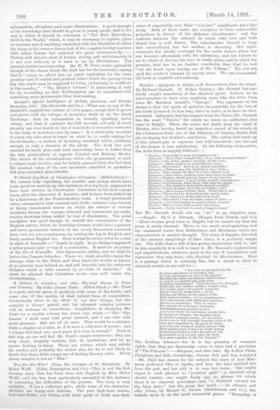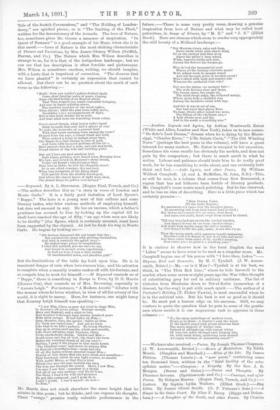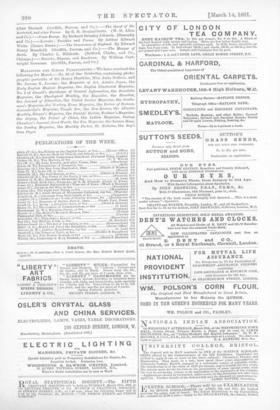Porray.—Iphigenia in Delphi, with Translations from the Greek, By Richard
Garnett. (T. Fisher Unwin.)—Mr. Garnett has °or- something more picturesque than boot-making. Willy caught something of the classical spirit. Indeed, we do not remember to have seen anything moro like the Attic form Burdett's Official Intelligence of British, American, and Foreign since Mr. Matthew Arnold's "Merope." The argument of the Securities, 1891. (Spottiswoode and Co.)—What can we say of Mr. drama is that the spirit of Achilles, inconsolable for the loss of Burdett's magnificent volume of 1,750 pages, except that it grows the bride promised to him long since in Anlis, is to have its wish and grows with the volume of securities dealt in on the Stock accorded. Iphigenia, having escaped from the Tauri (Mr. Garnett• Exchange ; that its information is, broadly speaking, never has the word " Tauris," for which we know no authority), has wrong; and that it contains the full account, not only of every come to Delphi. There she meets her death from the hand, of security one over heard of, but of hundreds of securities unknown Electra, who, having heard an imperfect report of the events at. to the body of investors even by name ? It is absolutely essential the Chorsonese from one of the followers of Orestes, thinks that to every one who cares to know on what ho is really relying for she is slaying her brother's murderess. The action that loads up his dividends,—a section of investing mankind which, curiously to this catastrophe is vigorous and well conceived ; but the en& enough, is only a fraction of the whole. The book has now of the drama is less satisfactory. In the following sticherauthia, reached its tenth year, and each succeeding issue is better than the Attic form is happily followed :—
" Electra.-0 enviable to mine the captive's lot I Elootra.—Siro, sister, mother, brother, all she took.
Iplagenia.—Fathers may fall, fighting in Ares' fields—
rphigonia.—But sisters, mothers, 130W shall these be slain?
Biactra.—Unfortunate, what, then, bath been thy. pang P Iphigenia.—Thou Inuit a brother, then. What fate is his ?
Iphigenia.-0 miserable, if this indeed the best I .Electra,—Where never shall a sister bevy them.
But link the light and shadow, and the time
And sleep apportioned. Thus the man for strength, For tender peace and patient sympathy.
With igneiat toncutolemulation.aul fillingwonder;lell li vgai.l hl thehit sphere isisihihaefrornhetotuto.lanii7fsieotTile qualities,
8.
The courage of endurance, constancy, And in her limbs the hardening muscle stirs To daring of advance—the broader mind Grown ono in will, through fragrant vales of life Their passing feet, it were no tender dream
They pace together in the Far Beyond!"
(Deighton and Bell, Cambridge; George Bell and Son, London.)
Tale of the Scotch Covenanters," and "The Holding of London- derry," are spirited pieces ; so is "The Smiting of the Fleet," written for the tercentenary of the Armada. The love of Nature, too, sometimes gives Mr. Groser a measure of inspiration. " In Quest of Summer" is a good example of his Mueo, when she is in this mood.—Love of Nature is the most striking characteristic of Themes and Variations, by Mrs. James Glenny Wilson (Griffith, Ferran, and Co.) The Nature which Mrs. Wilson describes is strange to us, for it is that of the Antipodean landscape ; but we can see that her description is often forcible and picturesque. Mrs. Wilson is sometimes careless, writing, wo should imagine, with a haste that is impatient of correction. "The sheaves that we have planted" is certainly an expression that cannot be allowed. But there can be no question about the merit of such verse as the following :- " Hark! from yon wattle's golden-fretted shade
Come okay familiar notes of music ringing, Some old bird-ballad of an English glade, That Time himself can scarce remember bAnging. And now hi liquid syllables above, The mocking songster of our wood replies, Then listens; while the pine trees softly move, Breathing a low accompaniment of sighs. Hid in this leafy cloister let us wait, And hoar what news the travelling winds relate.
Sweet miesel thrush, what loving exile's hand Bath brought thee over half a sphere of seas To wake the memories of a greener land With that brave morning-vnioe among the trees P Blipped from the cage, a truant frank and bold,
Thou seckest a home in leafage never bare, Our Daniio tree that blooms in rain of gold, And feeds with honeyed perfume all the sir— Here =vest then find a mate, and rest and build, Grand master of thy wild and warbling guild.
But yet I love our pied musician beet, Such tunes, perhaps, were heard when Morning drew His bow, and struck on Memnon's stony breast, Under old Egypt's rain-forsaken blue. Hear him at dawn; he tells his thoughts aloud : Or in our silent evenings, dry and cool, When rosy footprints of the flying cloud Still sparkle from the shallow forest-pool, And whore the sunset leaves of light were shed, One planet hangs its golden seed instead."
—Raymond. By A. L. Stevenson. (Kegan Paul, Trench, and Co.) —The author describes this as " a story in verse of London and Monte Carlo." It is a fairly good imitation of Lord Byron's " Beppo." The hero is a young man of fair culture and some literary tastes, who tries various methods of employing himself, but does not succeed in any. He has an income, which a father's prudence has secured to him by locking up the capital till he shall have reached the age of fifty, " an age when men are likely to be thrifty " (the figure, which is certainly unusual, must have been suggested by the rhyme). At last he finds his way to Monte Carlo. He begins by looking on " The fortune Raymond did not tempt that day; But watched the game with growing fascination, And (this is certainly the safest wayl-
He staked some pieoee in imagination. I tried this method, give me leave to say, And found it answer every expectation In half an hour I won a store untold Of unsubstantial notes, and phantom gold."
But the fascinations of the table lay hold upon him. He is in imminent danger of ruin when love rescues him; and his salvation is complete when a rascally trustee makes off with his fortune, and so compels him to work for himself.—If Raymond reminds us of " Beppo," there is something in Essays in Verse, by D. G. Harris (Horace Cox), that reminds us of Mrs. Browning, especially in " Aurora Leigh." For instance, " A Modern Ascetic " debates with 'the woman whom he loves whether, in view of all the misery of the world, it is right to marry. Here, for instance, one might fancy that Romney Leigh himself was speaking :- " I saw Him, Clare, as poor Art tried to shape Him, In Aneelm'e old green abbey. Strange enough, Mary and Raphael, and a saint or two, Had wcatber'd through their stormy hundred years With little ravage, It had fallen on Him,—
Rain, thunder, time, the spoiler—fallen on Him. No ' form nor comeliness.' And yet no form Like that to be Life's pattern. No Greek Phoebus,
Dug up in cream-curd marble, whole and smooth, Like those infantine rigid Passions, Mare,
From unseholastie chisels. Gibbet and Man- Death-beam and Son of Cod—Oh, that's the form
Makes the vertebral trunk of all our race (- Darling, I pray'd His prayer in that waste house,
Thy kingdom conic,' and strove to picture Him In Heaven's transfiguration—camp and eity
Of all His legion nations streeted round mm— Hearth of that Home that else were bleak and soundless—
That Forehead, which its own light crowns, as smooth With joyful Mercy, as that Eye is kind Which ever sees the man beneath the man The true one through the casual. M I
Glare, saw Him, I'm sure I saw Him—somehow in a dream Not all of my own making and He tied me.
The thing I lolled for with half-purposes
Be taut into command; and I must no it. I said I would. I vow'd myself—do now—.
To Him."
Mr. Harris does not reach elsewhere the same height that he attains in this poem ; but he thinks, and can express his thought. These " essays " promise really valuable performance in the
future.—There is some very pretty verse, drawing a genuine inspiration from love of Nature and what may be called local patriotism, in Songs of Situria, by "M, E." and "J. S." (Elliot Stock). Here are stanzas which seem to render very appropriately the still beauty of a Midland landscape :- "But Mercian rivers, calm and deep,
Down levels white with clever steal, Or on the ancient mill-dam sleep Above the miller's busy wheel, While, imperturbable and slow, Among the flowers the barges go.
Who delved the immemorial road Whore all the homing swallows meet? With willow-wort its margin sowed And led through miles of meadow-sweet? Who o'othed with light and sombre tido Whereon the anchored lilies ride?
Fair are the plains—to memory fair—
The wide horizon clear and large, The breezy space, the ample air, The wind-swept sedge, the willowed merge, Where Avon feels a doubtful way Among the meadows sweet with hay.
And fair it was at not of sun, Our keel upon that glassy floor,
To hear, where other souud was none,
The lifting of the rhythmic oar,— A holy silence near and far, And in the south a trembling star."
—Acadian Legends and Lyrics, by Arthur Wentworth Eaton (White and Allen, London and New York), takes us to new scenes. " De Soto's Last Dream," dreamt when he is dying by the Missis- sippi, "Charles River," " L'ile Sainte Croix," "The Old Whaling Town" (perhaps the best poem in the volume), will have a great interest for many readers. Mr, Eaton is unequal in his execution. Sometimes his verse recalls too obviously his models, and does not gain by the comparison ; but there is much merit in what he writes. Labour and patience should train him to do really good work, for he has something to write about, and can evidently both think and feel. —Lake Lyrics, and other Poems. By William Wilfred Campbell. (j. and A. McMillan, St. John, N.B.)—This, as will be soon, is a volume that comes from New Brunswick, a region that has not hitherto been fertile of literary products. Mr. Campbell's verse wants much polishing. But he has observed, and he has an idea of describing. Here is a little piece which has certainly promise " Bow SPRING NUE.
(To the Lake Region.) No passionate cry came over the desolate places, No answering call from iron-bound land to land ;
But dawns and sunsets fell on Mall, dead faces, And noon and night, death crept from strand to strand.
'Till love breathed out across the wasted reaches,
And dipped in rosy de, Vila from desolate deeps ; And woke with mystic songs tho muffin beaches, And flamed to life the pale, mete, death-like elope.
Then the warm south, with amorous breath inblowing, Breathed soft o'er breast of wri ,k'od lake and mere: And faces white from scorn of th, north's snowing, Now rosier greo to greet t le kindling year," It is curious to observe how in the local English the word " Lakes " seems to have come to be used as a singular noun. Mr. Campbell begins one of his poems with " I love thee, Lakes."— Rhymes, Real and Romantic. By M. C. Tyndall. (J. W. Arrow- smith, Bristol.)—Mr.—or is it Miss P—Tyndall is at his best, we think, in "The Thin Red Line," where he bids farewell to the scarlet, when some seven or eight years ago the War Office thought of substituting grey for red in military uniforms. The list of victories from Blenheim down to Tel-el-Kebir (somewhat of a descent, by-the-way) is put with much spirit.—The author of A Poetaster's Holliday (T. Fisher Unwin), is most successful when he is in the satirical vein. But his best is not as good as it should be. He must put a keener edge on his sarcasm. Still, we may venture to quote the question that he puts to some of the gentle- men whose merits it is our ungracious task to appraise in these columns :—
"Ye, the smug underlings of modern verse, Deign ye to think—is Poetry's song the worse If she should sound with grand sonorous blast The musio.majesty of Nature vast, Instead of whimpering with uneasy whine Of love-sick ladies through each limping line, Or, with much detail, spattering loose around An empty verbiage of tunneaning sound?"
—We have also received :—Poems. By Joseph Thomas Chapman. (J. W. Arrowsmith, Bristol.)—]'ours of Meditation. By Edith Morris. (Simpkin and Marshall.)—Bilen of the Isle. By James Flitton. (Thomas Laurie.)—A " new poem," containing some ten thousand lines, written in the "fatal facility of the octo- syllabic metre."—Campion : a Tragedy. By the Rev. J. G. Morgan. (Burns and Oates.)—Verses and Thoughts. By Florence Sovorne. (Spottiswoode and Co.) —Cassiope, and oilier Poems. By Boleyn() Reeves. (began Paul, Trench, and Co.)— Lostara. By Sophia Lydia Walters. (Elliot Stock.) —Day Ifities. By Jeanie Oliver Smith. (G. P. Putnam's Sons.)—A Singer in the Outer Court. By Alice F. Barry. (Biggs and Deben- ham.)—A Daughter of the South, and other Poems. By Charles Allan Sherard. (Griffith, Farran, and Co.)—The Quest of Sir Bertrand, and other Poems. By R. H. Dominichetti. (W. H. Allen and Co.)—Verse Essays. By Richard Brimley Johnson. (Stanesby and Co.)—Locasta : Parables and Poems. By Arthur Edward Waite. (James Burns.)—The Conversion. of England. By Edward Henry Bousfield. (Griffith, Farran, and Co.)—The Masque of Death. By Charles L. Hildroth. (Belford, Clarke, and Co., Chicago.)—Reveries, Rhymes, and Rondeaus. By William Cart- wright Newsome. (Griffith, Farran, and Co.)




































 Previous page
Previous page